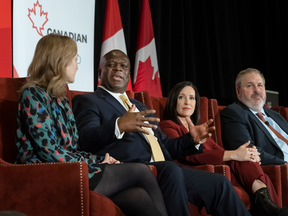By 2026, when $400-billion worth of mortgages are set to renew, increase in monthly payments could be as high as 48%

Article content
With 60 per cent of Canadian mortgages set to come up for renewal within the next three years, homeowners are facing a “payment shock” unless interest rates come down in a significant way, according to Royal Bank of Canada.
By 2026, when $400-billion worth of mortgages are set to renew — a figure that includes a large proportion of so-called negatively amortizing loans — the increase in monthly payments could be as high as 48 per cent on a weighted average basis, RBC Capital Markets analyst Darko Mihelic, said in a report Oct. 30.
Advertisement 2
Article content
Article content
“We believe a significant number of mortgages are coming due in the next three years” and “that payment shock (the increase in payment at renewal) could be significant and represents a tail risk to Canadian banks,” he wrote. “Unless there are significant declines in interest rates, we believe that credit losses will inevitably rise, perhaps significantly in 2025 and beyond.”
Mihelic predicts lower — but still significant — payment shocks of 32 per cent next year, when more than $186 billion of mortgages are set to renew, and 33 per cent in 2025, when about $315 billion of home loans will come up for renewal.

If the Bank of Canada’s overnight rate, which is now at five per cent, comes down by 100 basis points, that would reduce the payment shock in 2024 and 2025 to about 22 per cent or 23 per cent, according to the report.
But the cohort renewing in 2026 is likely to face the biggest challenges. That’s when a significant portion of variable-rate mortgages with fixed monthly payments are set to renew. Those borrowers have continued to make the same monthly payments as interest rates have gone up, but in many cases are now paying only interest each month, extending the length of time it would take them to pay off the loans — also known as negatively amortizing. When they renew, they will face much higher monthly payments.
Advertisement 3
Article content
“Variable-rate mortgagors are set to see significant payment shock, perhaps as high as 84 per cent by 2026 if interest rates do not decline,” Mihelic wrote. “Interest rates would need to decline significantly to ‘save’ this cohort.”
To reduce payment shock to 20 per cent for the entire variable-rate cohort, for example, the Bank of Canada overnight rate would need to fall to 0.25 per cent by July 2026, which Mihelic said is “perhaps an unreasonable expectation at the moment.”
On top of pain for borrowers, the dynamic creates a challenging environment for the domestic retail businesses at Canada’s large banks. RBC Capital Markets is maintaining its “tepid” forecast for revenue growth of about four per cent in 2024 and about three per cent in 2025 for retail banking in the country.
“We believe mortgage payment shock will likely impact loan/revenue growth, mortgage delinquency (though modestly) and losses on other forms of credit,” Mihelic said. But “Canadian banks are not sitting still and being rather proactive to reduce payment shock for their customers, which could have a significant impact.”
Related Stories
-

BoC hold means ‘suffocating’ mortgage payments to stay
-

OSFI pulls back on some mortgage proposals
-

90-year mortgage amortizations are a myth
Lenders are working with clients to get them to increase their monthly payments now, make lump-sum payments, extend the length of their loans or switch from variable-rate mortgages to fixed-rate loans, he said.
Bloomberg.com
Article content
Most Canadians with mortgages in store for payment shock, RBC says
2023-10-30 16:23:41








Comments
Postmedia is committed to maintaining a lively but civil forum for discussion and encourage all readers to share their views on our articles. Comments may take up to an hour for moderation before appearing on the site. We ask you to keep your comments relevant and respectful. We have enabled email notifications—you will now receive an email if you receive a reply to your comment, there is an update to a comment thread you follow or if a user you follow comments. Visit our Community Guidelines for more information and details on how to adjust your email settings.